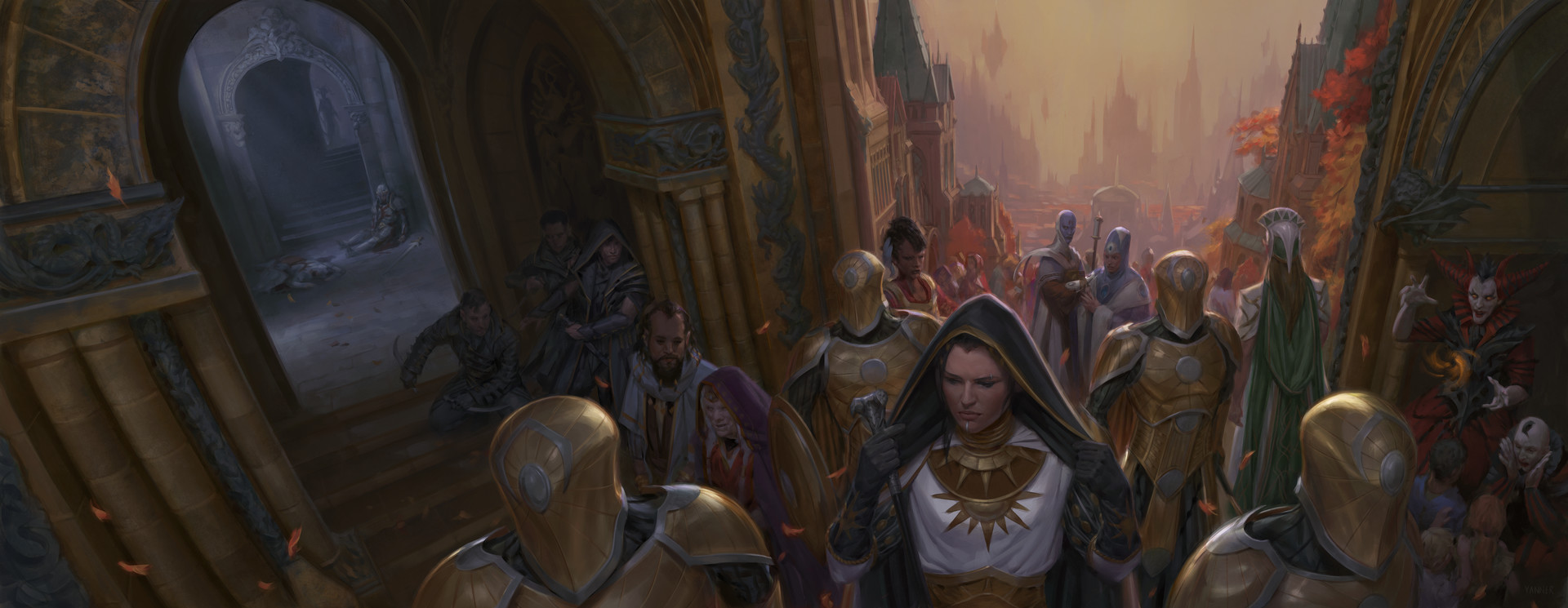Rank and Renown
See your guild for specific ranks.
Your status in your guild is measured by your renown score. As you increase that score, you gain the opportunity to advance in the ranks of the guild.
When you join a guild as a starting character, your renown score with that guild is 1. Your renown score increases by 1 when you do something to advance the guild’s interests, assuming that other members of the guild are aware of what you’ve done. Each guild’s description in this chapter includes a discussion of its goals and your role in pursuing those goals, which your DM will use to judge whether you earn an increase in your renown score.
The various ranks within the guilds describe the range of tasks you might perform, from testing experimental Izzet weaponry to leading a squad of Boros soldiers into battle. When you’re assigned a mission that involves an adventure—leaving behind your guild holdings and putting yourself in danger—and you complete that mission, your renown score with that guild increases by 2.
Other tasks that don’t involve adventuring can also improve your renown score. You can use the time between adventures to improve your renown within your guild by performing these tasks, as well as by socializing with prominent people in the guild. After doing so for a total number of days equal to your current renown score multiplied by 10, your renown score increases by 1.
At your DM’s discretion, you might also have a renown score in a guild you don’t belong to. You can’t ever formally advance in rank within another guild, but a high renown score can earn you additional contacts, favors, and other benefits. This option can be useful in an intrigue-heavy campaign where the adventurers spend a lot of time trying to influence the leaders of various guilds.
Benefits of Renown
As you gain renown in a guild, you gain certain benefits. Most benefits are guild-specific, but there are general benefits that apply no matter which guild you belong to:Renown 3 or higher: When you have a renown score of at least 3 with your own guild, you are an established and respected member of the guild. Other members of the guild have a friendly attitude toward you by default. (Individual members of the guild might have reasons to dislike you despite your renown.) They provide you with lodging and food in dire circumstances and pay for your funeral if needed. If you are accused of a crime, your guild offers legal support, as long as a good case can be made for your innocence or the crime was justifiable.
Renown 5 or higher: When your renown score with any guild reaches 5, you gain an additional contact within the guild. This contact might be a character you met during your adventures or someone who seeks you out because of your fame. Your DM will assign you a contact or have you roll on the Contacts table for the appropriate guild.
Some guilds—notably Azorius, Orzhov, and Boros—have well-defined hierarchies that characters can ascend through as they improve their renown scores. Other guilds have positions of honor that characters can apply for if their renown score is high enough. Not every member of the Selesnya Conclave aspires to be a sagittar (an archer assigned to guard an important guild location), but any character who meets the prerequisites can apply for the position. Ultimately, the DM decides whether a character qualifies for such a role, with a certain renown score as a minimum requirement.
Several guilds provide a salary among the benefits of renown within the guild. The salary is described as sufficient to maintain a lifestyle of a certain level. If you earn a salary, you can live at the specified lifestyle without paying the normal daily expenditure. See chapter 5 of the Player’s Handbook for more information on lifestyle expenses.
A prominent position in a guild often allows you to call on the services of lower-ranking members to assist you in your work. When you do, they are assumed to be loyal followers who help you to the best of their ability. Some of them are assigned to help you for the duration of a single task or mission, while others are under your permanent command, staffing a laboratory, workshop, or garrison where you are in charge. Depending on their role, they might help you in dangerous situations (like combat) or flee from them. You might assign them to perform tasks in your absence, which could include undertaking research, looking for witnesses to a crime, or carrying out a small-scale raid, for example, depending on their role and capabilities. You carry the responsibility for their lives and welfare, ultimately, and if the guild decides that you are abusing your authority and mistreating the members beneath you, you might lose renown, lose your rank or status in the guild, or even be cast out of the guild.
Losing Renown
If you commit a serious offense against your guild or its members, you might lose renown within the guild. The extent of the loss depends on the infraction and is left to the DM’s discretion. A character’s renown score with a guild can never drop below 0. If your renown score drops below the threshold for a rank or privilege you have attained, you lose that benefit. Even if you regain the lost renown, you might find it more difficult to again secure a position or rank you have previously lost.Remove these ads. Join the Worldbuilders Guild









Comments